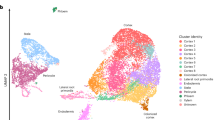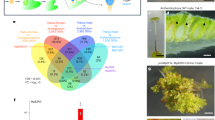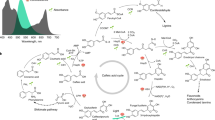Abstract
KINETIN (6-furfuryl aminopurine) is known to cause division in certain plant cells which could not otherwise divide1. But other cases are reported in which the rate of cell division is decreased after its application, for example, those of De Ropp2, Kemp et al. 3, Pilet et al. 4, and Ham et al. 5. How this substance affects the rate of division of animal cells is a question of interest. In a recent report6, Guttman and Back re-analysed data and repeated experiments in which they had previously7 found that kinetin causes an increase in the rate of division of Paramecium caudatum when added in low doses to the culture medium. Their later work6 indicated that stimulation of cell division was present, but on a lower level than that previously reported. Coincident with the appearance of the second report of Guttman and Back, we reported elsewhere8 the results of experiments in which kinetin, when used at the same concentrations and under similar conditions, was found to be inhibitory to division of P. caudatum.
This is a preview of subscription content, access via your institution
Access options
Subscribe to this journal
Receive 51 print issues and online access
$199.00 per year
only $3.90 per issue
Buy this article
- Purchase on Springer Link
- Instant access to full article PDF
Prices may be subject to local taxes which are calculated during checkout
Similar content being viewed by others
References
Miller, C. O., Skoog, F., Okumura, F. S., Von Saltza, M. H., and Strong, F. M., J. Amer. Chem. Soc., 77, 2662 (1955).
De Ropp, R. S., Plant Physiol., 31, 253 (1956).
Kemp, H. T., Fuller, R. G., and Davidson, R. S., Science, 126, 1182 (1957).
Pilet, F., Hildebrandt, A. C., Riker, A. J., and Skoog, F., Amer. J. Bot., 47, 186 (1960).
Ham, R. G., Eakin, R. E., Skinner, C. G., and Shive, W., J. Amer. Chem. Soc., 78, 2648 (1956).
Guttman, R., and Back, A., Science, 131, 986 (1960).
Guttman, R., and Back, A., Nature, 181, 852 (1958).
McManus, Sr. M. A., and Sullivan, K., Proc. Iowa Acad. Sci., 67, 501 (1960).
Wickson, M., and Thimann, K. V., Plant Physiol. (Supp.), 31, 28 (1956).
Lansford, jun., E. M., Skinner, C. G., and Shive, W., Arch. Biochem. Biophys., 73, 191 (1958).
Woodruff, L. L., and Baitsell, G., J. Exp. Zool., 11, 339 (1911).
Guttman, R., Chromosoma, 8, 341 (1956).
McManus, Sr. M. A., Nature, 185, 44 (1960).
Jensen, W. A., and Pollock, E. G., Plant Physiol. (Supp.), 33, 15 (1958).
Author information
Authors and Affiliations
Rights and permissions
About this article
Cite this article
McMANUS, M., SULLIVAN, K. Effects of Kinetin and Indole-3-acetic Acid on Multiplication Rates of Paramecium . Nature 191, 619–620 (1961). https://doi.org/10.1038/191619a0
Issue Date:
DOI: https://doi.org/10.1038/191619a0
This article is cited by
-
Effect of Kinetin on Bacteria
Nature (1963)
Comments
By submitting a comment you agree to abide by our Terms and Community Guidelines. If you find something abusive or that does not comply with our terms or guidelines please flag it as inappropriate.



